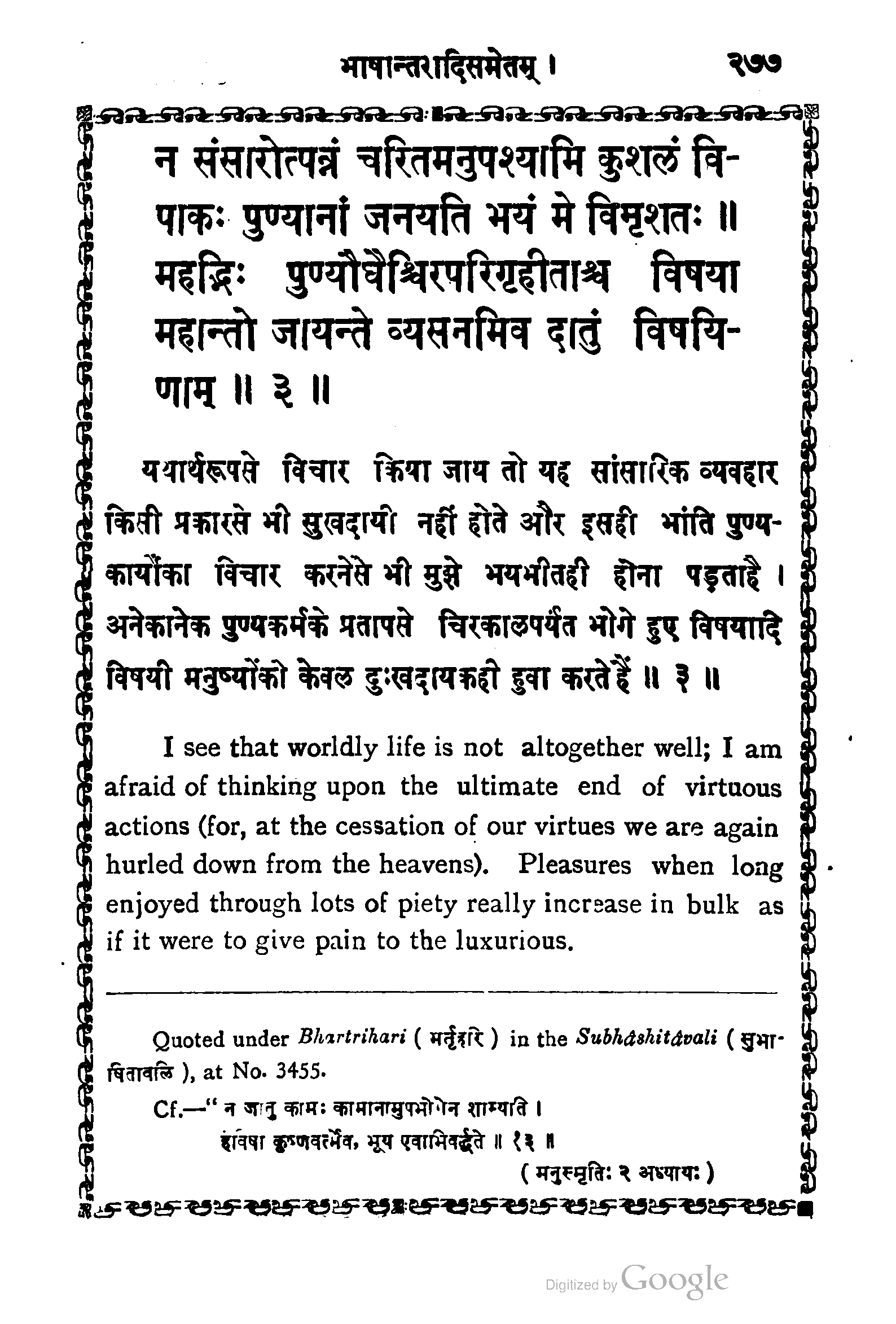Tawney
Mādhavānanda
Telang
verse

Text (not proofread)
न संसारोत्पन्नं चरितमनुपश्यामि कुशलं
विपाकः पुण्यानां जनयति भयं मे विमृशतः ।
महद्भिः पुण्यौघैश्विरपरिगृहीताश्व विषया
महान्तो जायन्ते व्यसनमिव दायुं विषयिणाम् ॥ ३ ॥
footnote

Text (not proofread)
III . ( c ) परिगृहीताथ ; ° मपि गृहीताथ . K. G. Bo . ( orig . Bo.n. ) परिग्रही
ताहि . B.
endnote


Text (not proofread)
St. III.³ = see in prospect . Comp . ¶ ¶fa , Gita
I. , 31. On the last two lines , the commentary is as follows : Heft :
पुण्यौषैः पुण्यसमूहै : चिरकालेन परिगृहोता सम्यग्धृता विषया महान्तीति खरूपतः
फळदानतो विषयिण रागिणां व्यसनं दुःखमेव जनयितुं उत्पादयितुं जायन्ते उत्पद्यन्ते इति
क्षोणे पुण्ये मर्त्यलोके विशन्तीति भगवद्वचनाच ( Gita IX . , 21 ) . Rāmarshi says
महद्भिः अतिगुरुभि : पुण्योधैः मुकृतसमूहै : कृत्वा ( sic ) चिरपरिगृहीता ( sic . )
चिरेण बहुकालेन परिगृहीताः स्वीकृताः एतेन चिरकाळ पुण्यानि विधाय प्राप्ता इत्यर्थ :
On the last line he says विषया : सक्चन्दनवनिताद्या वा ( sic ) विश्वयिणां
विषयवत महान्तः अतिगुरवो जायन्ते भवन्ति किं कर्तुमुत्प्रेक्षते व्यसनं भापदं दातुमिन
एतेन ते विषया यथा यथा महान्तो भवन्ति तथा तथा व्यसनानि भवन्तीत्यर्थः Ramar
shi's explanation is preferable . It must be remembered that
according to the Vedantic system ( see Vedantasara p . 2 Bana
ras Ed . ) , the acquisition of Heaven or स्वर्ग itself is nothing
comparable to मोक्ष . See too Stanza 81 infra . Ramarshi does not
state , nor does the other commentator , what the व्यसन is . It
would seem to be the greater attachment to material happiness
resulting from a long - continued enjoyment of a higher order of
material comforts such as are found in स्वर्ग ; and this is a व्यसन
as keeping one off from a . I think ft should be taken to
mean ' for a long time ' rather than ' after a long time .'-- S'ikharini .
Kosambi
verse

Text (not proofread)
न संसारोत्पन्नं चरितमनुपश्यामि कुशलं
विपाक : पुण्यानां जनयति भयं मे विमृशतः ।
महद्भिः पुण्यौघैश् चिरपरिगृहीताश च विषया
महान्तो जायन्ते व्यसनमित्र दातुं विषयिणाम् ॥ २६३ ॥
footnote

Text (not proofread)
263 { V } Om . in C X. GVs2387 ś extra 3 , and V6 . C 6 ) B2 D E 2 I
पुण्योधैश् . W चिरमपि ( for चिरपरि ) . ( 61M1.24 ° ता हि ; I ( by corr . ) तार्थ ( for
" ताश्च ) . - 4 ) G1 Y1 महन्तो . Ya X 2 . 3 इह ; ( i 1 M अपि ( for इव ) . 4 A हातुं ; F3 जेतुं : J2t
धातुं ; ( 13t दातुर . Est 4 ( m.v. as in text ) व्यसनिनां ; X 3 विषविनां .
BIS . 3476 ( 1484 ) Bhartr . cd . Bohl . Haeb lith ed , I and II , and Galan 3 .
3 ; SRE . p . 368 43 ; SBII . 3455 ( Bh . ) ; SSD . 4. f . 8b .

